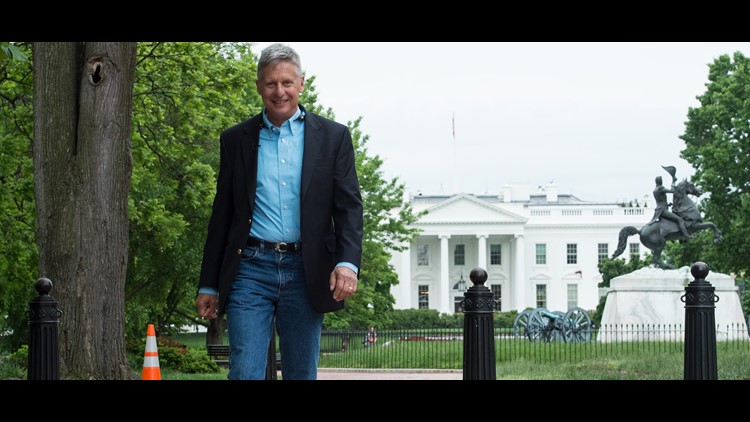Hillary Clinton and Donald Trump are historically unpopular, but large numbers of Americans who can’t stand them will likely vote for one of them anyway. They’ll do this because, among other reasons, they’ll feel forced into choosing the lesser of two evils.
And they shouldn’t feel (or more importantly, vote) this way. U.S. presidential elections were never supposed to devolve into contests between just two people, even though that’s what happens in a winner-take-all system such as ours. The Constitution does not mention political parties at all, and the Framers were worried that the rise of powerful factions would undermine liberty. As John Adams wrote in a letter in 1780: “There is nothing which I dread so much as a division of the republic into two great parties, each arranged under its leader, and concerting measures in opposition to each other. This, in my humble apprehension, is to be dreaded as the greatest political evil under our Constitution.”
And even in 2016, voters still have choices beyond Clinton or Trump. A viable third party has put forth a compelling alternative in the form of libertarian Gary Johnson. For the second presidential election in a row, the Libertarian Party has chosen Johnson, a softspoken entrepreneur and former governor of New Mexico, as its candidate. His running mate is the impressive former governor of Massachusetts, William Weld. And just in the last few days, David French — a constitutional lawyer, National Review writer and Iraq war veteran — has emerged as a potential independent candidate.
Both served as moderate Republicans who generally opposed runaway government spending while advocating social tolerance. Weld cut spending and privatized state services, earning high marks from the Cato Institute, a libertarian think tank. Johnson pushed for school choice reforms and low taxes. Both supported drug decriminalization and same-sex marriage. As such, both embody the libertarian philosophy that government should leave people alone, an approach that is broadly popular with the American public.
Many voters are quick to dismiss third-party candidates, but Johnson and Weld are different. Between them, they have 16 years of successful executive experience as governors, working effectively with legislators, opposition and the business community alike. Contrast this with the presumptive Republican and Democratic nominees: Donald Trump is a thin-skinned reality TV star with an authoritarian streak, and Hillary Clinton is a former secretary of state whose signature contribution to foreign policy — the 2011 military intervention in Libya — was an unmitigated disaster. It’s no wonder Americans are reacting unfavorably to the idea of deciding whether Donald Trump’s complete lack of experience, decorum and honesty are more disqualifying than Hillary Clinton’s sleaziness and corruption.
And yet they will continue to struggle, because Americans are being bombarded by talking heads and political operatives depicting this race as a clash between just two choices: Democrat or Republican, left or right, A or B. People who even entertain other options are castigated for throwing away their votes. The GOP, in particular, is fond of telling people that a vote for the Libertarian Party is a vote for Clinton (and it tried a similar tactic in 2012 with President Obama).
In reality, nothing could be further from the truth: A vote for Johnson isn’t a vote for anyone other than Johnson. Indeed, the Founders never intended to set up a system that continuously produced just two choices, and modern Americans recognize that it’s almost always better to have more choices than fewer. Consumers want the option to shop around for everything from cable companies to health care providers to ice cream flavors. Additional choices provide people with more autonomy and agency to make the decision that fits them, rather than feel morally obligated to engage in a “less-bad” calculus.
This is, coincidentally, the creed of the Libertarian Party: that choice allows people to be happier and more fulfilled, and government interference reduces choice by limiting competition. This belief comes from a place of philosophical consistency among fiscal, foreign and social policy — a rarity, among politicians. Libertarians are, for instance, as uncomfortable with the government telling them who they can marry as they are with the government telling them who they can pay to Uber them around town.
If voters aren’t in love with this philosophy, or for whatever reason don’t think Johnson is their man, they are free to vote for someone else, including the presumptive major-party candidates. But voters who overlook Johnson as a viable option just because they’ve bought into lesser-of-two-evils urgency need a reality check. No one person’s vote has ever, or will ever, determine the outcome of a U.S. presidential election. While it’s true that every vote counts, for the individual voter, voting is a largely symbolic act.
The most important thing any voter can do is vote for the person who best embodies his or her ideals, whether or not that candidate has a good chance at winning the White House. Johnson has no realistic chance, but high turnout for the Libertarians could qualify them for debates, campaign funding, and help grow the party in numerous other ways.
So if you’re reading this and are one of the many agonizing over voting for Trump or growing sick to death of the Clintons, know you have the option to vote for the person you actually want to be president. That could be Gary Johnson and William Weld, but it need not be. And the same holds true for independent candidates like David French. Celebrate choice on Election Day, and you won’t walk out of the ballot box feeling profoundly dissatisfied.



